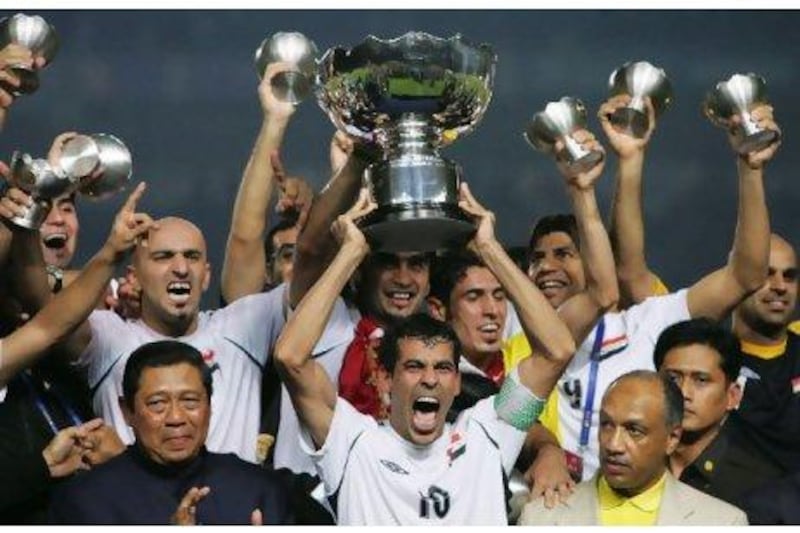On its surface, the Asian Cup is a mundane concept.
Sixteen teams from the continent gather once every four years to determine whose football team is best. What could be simpler?
But scratch that surface, and what is revealed is perhaps the most exotic, most sprawling, most eclectic sports competition staged on the planet.
To consider Asia is to stretch the mind to its breaking point. Home to more than four billion of the world's seven billion people and 30 per cent of its land mass.
A continent of dazzling ethnic and cultural variety which includes forms of government that span nearly the range of human political expression.
Asia certainly is a player at global sports events such as the Olympics and football World Cup. But in those events the Asian teams and individuals often are overborne by competitors from Europe, Africa and the Americas.
Last summer's World Cup in South Africa, for example, included only four Asian sides; Europe had 13.
The Asian Cup is both more and less exclusive. By shrugging off the other continents, it opens up its tournament to countries that love football but may not quite be ready to go toe to toe with the likes of Spain and Brazil.
Such is the case with the 2011 Asian Cup, which begins in Qatar on Friday.
This event seems more inclusive, not less. China and India will play. So will Japan and both Koreas. Iran and Iraq. Jordan, Syria and Kuwait. Uzbekistan and Australia ("Asian" for the purposes of football administration). And no fewer than four teams from the Arabian Peninsula, including the UAE.
The 2011 Asian Cup comes at a particularly auspicious moment in history, too, both geopolitically and in the frivolous but impassioned world of football.
At a time when Asian economies now occupy two of the top three rungs in the world, with India primed to break into the top 10; when the term "basket case" no longer is coldly applied to several of the continent's polities; when, in fact, the immense stretch of territory from Lebanon on the Mediterranean to South Korea on the Pacific seems to be brimming with energy and optimism that tomorrow will be better than today and the next day better still.
One prominent example of Asia's rise came on December 2, when football's global governing body, Fifa, awarded the 2022 World Cup to Qatar, at a stroke committing the planet's most popular sports event to west Asia and the Muslim world for the first time.
Now, barely a month later, Qatar is staging the Asian Cup and preparing to welcome an expected 150,000 visitors along with 15 international teams, and even with billions of dollars in promised stadiums and infrastructure far in the future, how can this tournament not be considered a test of its ability to successfully host the 2022 World Cup?
Big thoughts aside, for us simple fans of sport, the Asian Cup is crackling with compelling story lines.
Can the two big underachievers in world football show that they are making progress? China has 1.3 billion people but only one World Cup appearance, in 2002, and no Asian Cup victories. It has the world's No 2 economy and won the most gold medals at the 2008 Beijing Olympics.
However, football remains the nation's most popular sport and the country's recent failures in what it recognises as the most egalitarian of sports are, apparently, a source of deep consternation and embarrassment for the People's Republic.
Then there is India, cricket mad, but at least back at the Asian Cup table for the first time in 27 years. Would three thrashings in the group stages encourage Indian interest in football, or kill it?
Iran and Saudi Arabia, along with Japan, have won the most Asian Cups, three. The Saudis last year were absent from the World Cup for the first time since 1990 and will be keen to show they remain continental heavyweights.
Iran also stayed home last year but loom as contenders. It is curious, but a fact, that Iran's three Asian championships came while Shah Reza Pahlavi sat on the Peacock Throne.
His revolutionary successors are sure to know that statistic.
The UAE, Bahrain, Kuwait and Qatar carry the torch for nations who adore the game but draw on tiny populations. Qatar seems to be addressing the issue by naturalising foreigners; the key players Fabio Cesar and Sebastian Soria were born in Brazil and Uruguay, respectively. Expect Mohammed Khalfan al Rumaithi, the president of the UAE Football Association, to be watching closely.
And Iraq are back. The team from a country caught up in violence for much of the past 30 years were the shock victors of the 2007 Asian Cup, defeating the Saudis 1-0 in an emotional final in Jakarta.
A repeat seems unlikely, but their 2007 run stands as a symbol for the infinite possibilities for Asian nations in the second decade of the 21st century.





